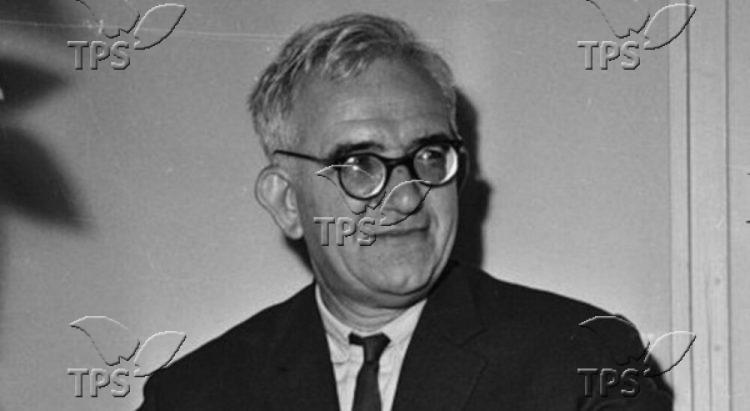Atanas Dalchev: The (Meta)Physical Poet
Jerusalem, 11 June, 2023 (TPS-IL) -- SOFIA, 11.06.2023 (BTA)
Atanas Dalchev (1904-1978) is among the best known and most widely read Bulgarian poets. His works appeal even to people who shun poetry and do not fancy aphorisms and impressions about art. In addition to his original work, he also translated a large amount of fiction and poetry published between the 1950s and 1970s.
While he did not aggressively reject the social order under Communism, he was too detached from the world he was forced to live in to make it to the literature textbooks of that period. Tolerated as he was, his works were definitely not part of the poetry officially endorsed by the regime.
His biography offers some clues to the ambivalent response to his art. Dalchev was born in Thessaloniki, then part of the Ottoman Empire. The family moved to Sofia in 1913, and Atanas finished one of Bulgaria’s best educational establishments, Boys’ Secondary School No. 1, in 1922. Five years later, he graduated in Pedagogy and Philosophy from Sofia University.
The young man developed a profound interest in history of art and history of culture. Dalchev spent years abroad: in Italy, France (Paris and Toulouse), London and Istanbul. He was fluent in several languages. His elder brother, Lyubomir (1902-2002), became a famous sculptor; his younger brother, Boris (1910-1987), became a famous architect.
Atanas Dalchev was among the leading Bulgarian poets of the 1920s and 1930s. After the Communist takeover in 1944, he was among the first writers to be attacked by the new establishment.
His aesthetic platform had little to do with Socialist Realism, an artistic concept that dominated Bulgarian art at that time. He found himself jobless, almost without means of livelihood, and was stigmatized for practicing aesthetic formalism, engaging in art for art’s sake, and writing “for a selected audience of snobs”.
Dalchev responded in a striking and deeply individual way: he maintained poetic silence for years.
Luckily, he was an exceptional translator, with a refined sense of meaning and poetic talent that enabled him to understand writers of different ages and render their “poetic” idiom into Bulgarian regardless of the language of the original. All this helped Dalchev establish himself as a prominent translator of poetry and fiction from French, Spanish, English, German and Russian. He breathed the spirit of past times and distant cultures into his translated texts.
Quite a few underrated his contribution to intercultural understanding and regarded translation of adventure stories as inferior to poetry and philosophy. His contribution, though, did not go unnoticed abroad: he was awarded the German-Austrian Herder Prize in 1972 (for his overall literary work) and the Russian Znak Pocheta Order (or Order of the Badge of Honor) in 1967 (for popularizing Russian culture in Bulgaria).
There was obviously no way to brand such an artist as an enemy (even in ideological terms). Thus, Communist-era critics had to be more careful. Dalchev could never qualify as socialist realist. He was not only alien to that method, but “the influence of decadence” was “undoubtedly felt in some of his works” (as a 1976 reference book put it). On the other hand, it was impossible to deny or minimize Dalchev’s cultural contribution. He proved immune to being tamed through honors and privileges. He could not be crossed out or consigned to oblivion. He had carved out a niche of his own, and even the establishment accepted that fact.
In 1978, an obituary signed by communist dictator Todor Zhivkov and other party and culture dignitaries eulogized Dalchev as “one of the greatest masters of the Bulgarian written word” but noted condescendingly that he “covered a complex creative path of soul-searching and contradictions”. The death notice acknowledged his “non-prolific but original poetic work” but brazenly claimed that after 1944 he “channeled all his creative efforts into building the socialist society”.
It was not the building of socialism but the ever-troubled human soul that stood at the center of Dalchev’s poetry. That is what ensures him a readership for many years to come.
Following is a sample of Dalchev’s poetry – his poem “Evening” (1930):
Why can’t we be, at the same time,
both here and there – everywhere
life beats continuously and hard?
We are always dying, slowly disappearing
first from this place, then from another,
until we vanish altogether in the end.
(Translated by Roy Macgregor-Hastie)
Why is it that we cannot all at once
Be here and there – at once be everywhere
When life throbs powerfully without ceasing?
We die continually, we slowly vanish
First from one place, then later from another
Until at last we disappear completely.
(Translated by Peter Tempest)


